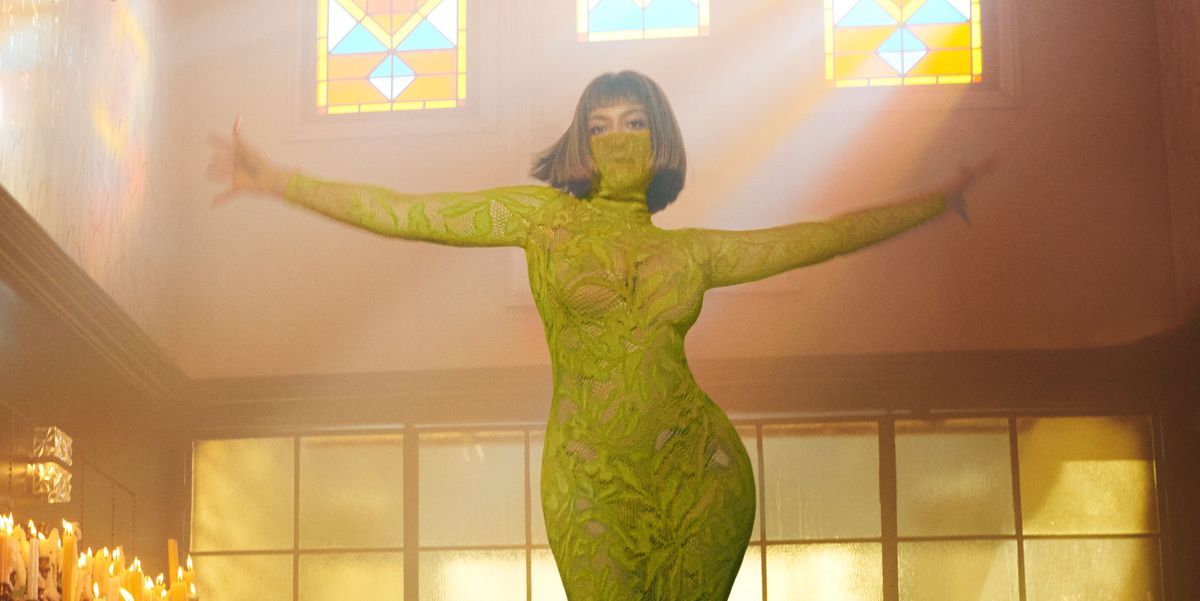I never imagined that I’d be shaking my ass to a song called “Church Girl.” But there I was, in my bedroom, shaking my ass to “Church Girl,” the seventh track on Beyoncé’s Grammy-nominated album, Renaissance. The song samples “Center of Thy Will” by African American gospel legends The Clark Sisters and begins with the following words written by Elbernita “Twinkie” Clark: “Lord, place me…I want to be centered in thy will.” While The Clark Sisters sing, Beyoncé also sings harmoniously, as if she is in a gospel choir. But then the beat drops, and “Church Girl” quickly goes from religious to raunchy.
Although the song switches up, it remains spiritual. “I’ve been up, I’ve been down. Felt like I moved mountains. Got friends that cried fountains,” Beyoncé sings about life’s challenges. But what’s powerful is that she tells us that she doesn’t stay in that dark place forever. Beyoncé reveals that she liberates herself by loving up on her body and acting loose, and through lyrics such as “Twirl that ass like you came up out the South, girl,” she encourages Black women to do the same. Beyoncé knows that twerking is the exact opposite of what people expect from a church girl, but none of that matters to her; she decides to be the church girl that she wants to be.
As a Black—and more specifically, African American—Christian woman with Southern roots, I can relate to the church girl experience that Beyoncé is singing about. When I was growing up, my parents instilled the importance of saying grace before eating, going to church every Sunday, and reading the Bible and praying before going to bed. And even though I was born and raised in New York, Southern African American Christianity inevitably influenced my upbringing. My mother, who is African American, raised me based on the teachings that she learned from her mother, who is African American and from North Carolina. These were the same teachings that my grandmother learned from generations of Southern African American women who came before her as well. I was taught how to dress, speak, and act “respectably” because this was a part of honoring God.
But as I grew older, I developed my own relationship with God—one that was less orthodox than my parents’. In God, I found freedom, and it was this freedom that inspired me to ignore other people’s expectations and be the church girl that I wanted to be. Just like Beyoncé, I began loving up on me—regardless of what other Christians thought about it. During college, I started dressing more freely. I wore outfits that accentuated my beautiful, thick body shape even though these were the same outfits that the elders in my family and community typically considered to be “too revealing.” Other times, I wore clothes that weren’t “girly.” I also embraced my sexuality more and rid myself of the shame that the Church tried to impose on me for doing so. As “Church Girl” continues to resonate with me, I realize that Beyoncé isn’t just singing about a personal experience, she is also preaching a sermon. With as much fire and fervor that I’ve heard pastors preach with on a Sunday morning, Beyoncé is reminding Black women that our bodily autonomy is divine. She is shining light on a truth that, for centuries, society has tried to prevent Black women from embracing, especially in places such as church, school, the workplace, the media, and even our own homes.
Society’s attempt to deny Black women of our bodily autonomy originates from the global institution of chattel slavery. White and Native American enslavers sold, brutalized, raped, and impregnated Black women. By subjecting Black women to physical abuse, enslavers hoped to control not just our bodies, but also our minds. Their goal was to keep Black women in bondage by making us—and the rest of the world—believe that Black women did not have the right to make decisions about our own bodies. So even after chattel slavery was “abolished,” the attack on Black women’s bodily autonomy persisted because enslavers had ingrained their lie in every institution, even those that exist in our own communities. For instance, in the United States specifically, the Black Church was established by free and enslaved Africans who sought refuge in the midst of indescribable suffering. Enslaved Africans congregated to sing, shout, and pray—their cries reaching the heavens and their hearts set on the belief that God would free them from bondage. It was in these moments that my ancestors experienced spiritual liberation.
The Black Church also served as a catalyst for physical liberation. Even though white people used Christianity as a tool of oppression, enslaved Africans such as Harriet Tubman, Sojourner Truth, and Nat Turner developed their own relationships with God and were inspired by the gospel to organize revolts and fight for their freedom. Later on, during the Civil Rights movement, African Americans convened at churches to organize marches, sit-ins, and other protests. However, an institution that was initially a place of refuge also became a place of subjugation for many, especially for Black women. Members of the Black Church began to perpetuate the oppressors’ misogynoir, and once again, Black women were told the lie that we did not have the right to make decisions about our own bodies. We were told what to wear, when to have sex, who to have sex with, and how to use our bodies. Growing up, I was told by adults within the African American Christian community that “my body is a temple.” But they were not referencing this Bible scripture to empower me. They were trying to caution me, as if one wrong move could taint or impurify me.
In “Church Girl,” Beyoncé rejects this purity culture. When she boldly declares, “Nobody can judge me but me. I was born free,” she is reminding Black women that our bodily autonomy is God-given; no one can say or do anything to take it away from us. Beyoncé insists that by acting loose and twirling our ass, we are not being sinful—we are “doing God’s work.” And while this lyric might sound sacrilegious to some, it’s actually quite the opposite. If my body is a temple (and it is), then there is no better way to glorify God than by basking in the freedom that was always meant to be mine.
I am so proud to come from a long line of Southern African American women on my mother’s side of the family. They have passed down so many sacred things to me such as hymns and spirituals, soul food recipes, holiday traditions, words of wisdom, and more. However, when I think about the generational traumas that I want to let go of, purity culture is near the top of the list. This trauma—this lie—was never our burden to carry.
In the second verse of “Church Girl,” Beyoncé sings, “I’m finally on the other side. I finally found the urge to smile.” I can wholeheartedly relate to this lyric. I am at a point in my life where I am experiencing a spiritual rebirth. I see the light. I know the truth, and the truth is that my bodily autonomy is divine. Nobody can crucify me; I was born free, and other people’s expectations are not my cross to bear. Today, people are still attempting to deny Black women of our bodily autonomy by attacking our reproductive rights, policing our sexuality and gender expression, and inflicting sexual violence. But one thing remains true: Black women have the right to make decisions about our own bodies. And there is no pastor, politician, parent, or partner who has the authority to make these decisions for us. I pray that every Black woman internalizes this truth—because the truth will set you free.
Olusade “Sade” Green is an activist, writer, and poet who fights for the liberation of all marginalized people, especially for Black women and girls.

